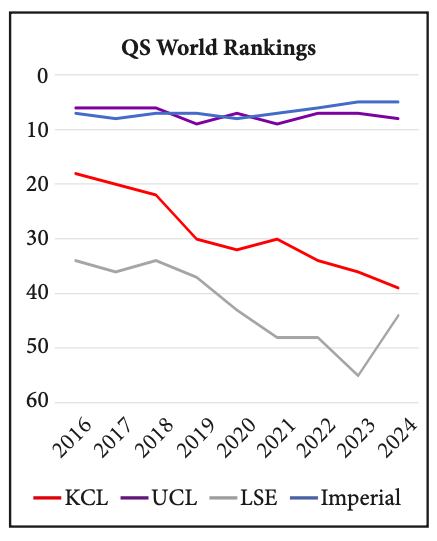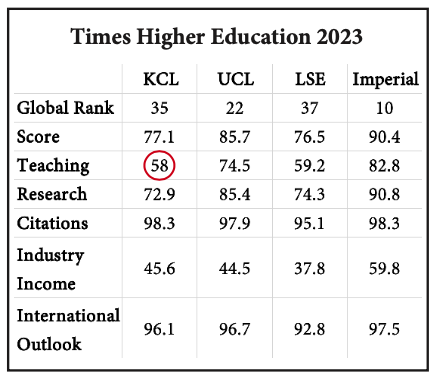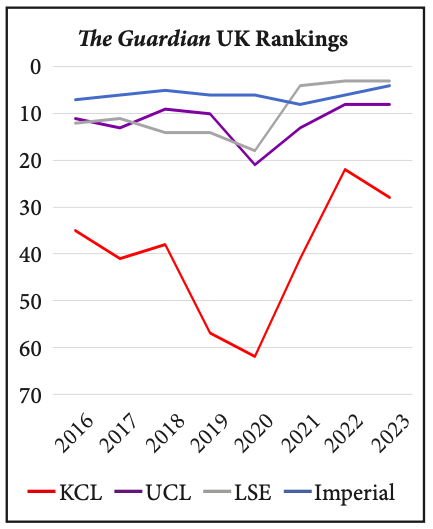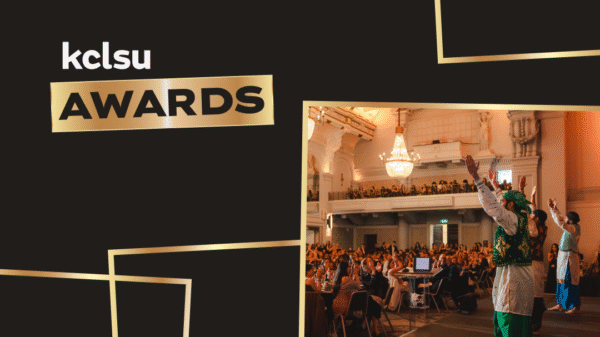Editor-in-Chief Fintan Hogan discusses the decline of King’s College London (KCL) compared to its city peers.
“King’s is ranked in the top 10 UK universities in the world (QS World Rankings 2021)” reads the first Google search result for ‘King’s College London’. Despite the launch of the 2024 QS Rankings in June making this (strangely phrased) webpage description three years out of date, the claim itself is still true. KCL has ranked #7 for British universities in the QS rankings since 2019. Imperial College London has stayed at #3, University College London (UCL) at #4 and the London School of Economics (LSE) at #8.
At first glance, this suggests remarkable consistency among the top London universities. Yet the higher education sector of the UK on the whole has been in decline over the last decade, with the exception of a few stand-out institutions. While KCL does still rank #7 in the UK, its global ranking has fallen from a high of #16 in 2015 down to #40 today. Over the last decade, there has been a decline in every annual update except one.
LSE has also followed a downward trajectory, but has still managed to close the gap on KCL. Most notably, UCL and Imperial have remained in the top 10 global institutions, representing the UK alongside Oxford and Cambridge. This has created two tiers of elite British universities, as the top four remain consistent global leaders while the rest fall away. While KCL can still boast about its top 10 domestic status, it is falling behind its international and University of London (UoL) competitors nonetheless. The disparity between UCL and KCL in institutional rankings has never before been this pronounced.

King’s performs particularly badly on ‘Employer Reputation’ and ‘Employment Outcomes’ when compared to UCL, LSE and Imperial. At a time of slow economic growth and spiralling living costs, this may particularly concern recent graduates.
Furthermore, the QS ranking system underplays KCL’s decline. Based predominantly on reputation, research and international outlook, it favours established universities over those with high student satisfaction and impressive recent performance. Famous institutions like King’s are supported by a positive feedback cycle since they appear reputable in part simply due to their previous rankings.
Metrics which consider student experience more prominently tend to punish prestigious universities during times of dissatisfaction. The Times Higher Education ranking places KCL at #35 worldwide despite its strong results in ‘Research’ (72.9), ‘Citations’ (98.2) and ‘International Outlook’ (96.1). King’s has fallen by 8 places since 2016 mainly thanks to its decline in its ‘Teaching’ score, which has fallen from 64.5 to 58.0. The other metrics have been relatively stable. This decline has opened up a substantial gap with UCL and Imperial, who score 74.5 and 82.8 for ‘Teaching’ respectively.

This is even more pronounced in The Guardian’s UK university ranking. Out of the four main London universities, King’s ranks last in ‘Course satisfaction’, ‘Teaching satisfaction’, ‘Feedback satisfaction’ and ‘Staff to student ratio’. In 2021, KCL’s President and Principal Shitij Kapur called The Guardian’s ranking table one of “the most important league tables in the sector”, yet King’s has not been inside the top 20 for over a decade. The other three main London universities are currently all placed in the top 10 and have consistently out-performed KCL.

There is some cause for hope. KCL scores well for its Medicine (#10) and Law (#19) departments under the Times Higher Education ranking, and in International Relations (#2), Politics (#7) and Law (#7) with The Guardian. The War Studies department is also one of the most prestigious and successful globally.
Yet this is papering over the cracks of the overall student experience. The Complete University Guide puts KCL students’ satisfaction at #119 out of 128 institutions nationwide. In contrast, Imperial rank #33, UCL #49 and LSE #58. Contributing factors likely include waves of strike action, KCL’s poor sporting culture, the perceived failure of adjustments for disabled students, London’s cost of living crisis and the increasingly hostile atmosphere of student politics.
The 2023 National Survey of Students (NSS) was released this August and shows a similarly dire performance. In 2014, King’s set a goal that NSS feedback should not “fall below the current sector averages of 72 for Assessment and Feedback, 81 for Academic Support… [and] also maintain or improve our current overall score of 88 for Teaching”. The respective scores are now 68.0, 80.6 and 83.3.
KCL now ranks below the ‘benchmark’ (which “reflect[s] the sector average positivity measure but adjusted to reflect the mix of students and subjects at the provider”) in almost every single aspect of feedback. According to the NSS, all except one of the 27 questions about student experience are responded to more negatively by King’s undergraduate students than by students in comparable institutions. In contrast, UCL and LSE score below the benchmark for 16 questions, and Imperial only in five.
For institutions with over 1,000 responses, KCL ranked #108 out of 114 for ‘Q24: How clear is it that students’ feedback on the course is acted on?’. Other questions with particularly negative feedback include ‘Q14: How often does feedback help you to improve your work?’, ‘Q17: How well organised is your course?’ and ‘Q26: How well communicated was information about your university/college’s mental wellbeing support services?’.
The NSS is intended to “inform prospective students’ choices”, “provide data that supports universities and colleges to improve the student experience” and “support public accountability”. It is completed by thousands of King’s students every year, at the request of the university. Yet considering KCL always receives far more applications than available places, there is little economic incentive for King’s administrators to act upon the feedback of its students. In response to a Roar request for comment, a King’s College London spokesperson said:
“We attract outstanding students from a wide range of diverse backgrounds and all students are supported to achieve excellent outcomes. This is reflected in our position as one of the most targeted universities by employers, placing 2nd in London and 12th in the UK by High Flier’s Graduate Market in a 2023 study; with 90.87% of those in work in highly-skilled employment a year after graduating.
“Our student experience is independently assessed by the teaching excellence framework in which we currently have a Silver rating, and we greatly appreciate the valuable insights our students provide through surveys such as the NSS to progress and improve this.”
Roar can only find acknowledgement of the 2022 NSS results on KCL’s website in two places: an Institute of Psychiatry, Psychology & Neuroscience (IoPPN) notice and the Sport & Exercise Medical Sciences BSc course information page. There may be further mentions, but the editorial team has not been able to find them. Acknowledgement of the 2023 NSS first appeared three days after Roar’s request for comment. KCL management are currently looking for a new Strategic Projects Manager who would have responsibilities including “managing enhancements to the student experience in response to student surveys such as the National Student Survey (NSS)”.
All King’s students can still look forward to receiving a degree from one of the most prestigious institutions in the country. Yet international and cross-city comparisons no longer look favourable for the university which once claimed the throne.













